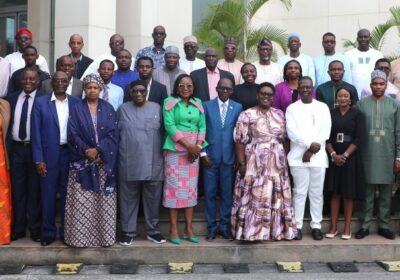Chinese Firms and African Seaports: A Closer Look at Chinese Expanding Influence in African Commerce.
By Raymond Enoch
The African maritime industry is undergoing a seismic transformation, with Chinese firms playing an increasingly dominant role in the management and operations of commercial seaports across the continent. A recent tally by the Washington-based African Center for Strategic Studies reveals that Chinese companies are active stakeholders in a staggering 78 out of 231 African commercial ports. This accounts for roughly one-third of all ports in Africa, marking a far greater presence than Chinese firms have in any other region globally.
The scale of Chinese involvement in African seaports is unparalleled, raising critical questions about the opportunities and challenges tied to such deep foreign involvement in one of the world’s most important maritime trade hubs.
From the bustling docks of Lagos in Nigeria to the strategic port of Djibouti in the Horn of Africa, Chinese companies have established a formidable footprint in African trade networks. These investments have not only bolstered China’s economic footprint on the continent but have also positioned these firms as crucial players in the movement of goods between Africa, Asia, and the rest of the world.
Chinese investment has been critical in the construction of vital infrastructure, including container terminals, bulk cargo facilities, and docking infrastructure. Through agreements and partnerships, Chinese firms have secured long-term operating contracts, which often include management rights and shareholdings in African port authorities. In places like the Port of Mombasa, Kenya, Chinese firms have been involved in upgrading port facilities to increase cargo handling capacity, while in places like the Port of Durban in South Africa, China is a key partner in operational management and modernization efforts.
Chinese firms have a significant presence in the seaports of several African countries, including Nigeria, Ghana, Tanzania, Kenya, Senegal, and South Africa.
To underscore this, Paradigm News took the review of their involvement in the selected seaports below given the strategic role these countries play in the movement of good and population in Africa
Nigeria Chinese companies are highly active in Nigeria’s major ports, including the Port of Lagos, the largest and busiest port in West Africa. Notably, China Harbour Engineering Company (CHEC) has been involved in constructing new container terminals and modernizing existing ones to improve capacity and efficiency. Chinese companies are also linked to Nigeria’s rail projects aimed at enhancing connectivity to the ports. In Ghana, Chinese firms have invested in key infrastructure at the Port of Tema, the country’s main commercial seaport. China Harbour Engineering Company has expanded the port’s capacity by constructing new terminals and cargo handling facilities. The presence of Chinese firms also reflects broader trade relationships, as China remains one of Ghana’s largest trading partners, boosting Ghana’s position as a regional shipping hub..Also in Tanzania’s Port of Dar es Salaam has also seen increasing Chinese involvement. Chinese firms, particularly China Harbour Engineering Company, have been involved in port expansion projects to improve container capacity and general cargo handling. In addition, Chinese investments in Bagamoyo Port, a future mega-port project, aim to significantly boost Tanzania’s shipping capacity. This project is part of China’s Belt and Road Initiative (BRI), linking Tanzania with global trade routes.
The same thing applies to Kenya’s Port of Mombasa, a critical gateway for East Africa, has seen substantial Chinese investment. Firms like China Road and Bridge Corporation (CRBC) have contributed to expanding port facilities and constructing the Mombasa Port Terminal II to handle larger volumes of cargo. Moreover, the Chinese-built Standard Gauge Railway (SGR), linking Mombasa to Nairobi, enhances port connectivity, positioning Kenya as a central hub for regional trade.
The West African Senegal’s Port of Dakar, has attracted significant Chinese investment. China Harbour Engineering Company has expanded port infrastructure and improved cargo handling capabilities. The Belt and Road Initiative has also strengthened Chinese involvement, funding the construction of new terminals to boost Senegal’s competitiveness in global trade.
The Port of Durban in South Africa is one of the busiest ports in Africa, has also seen significant Chinese investment. Chinese firms have contributed to developing new facilities to improve container throughput and cargo handling. Furthermore, investments in Port of Cape Town and other South African ports focus on improving logistics and trade connectivity, with Chinese companies participating in projects to modernize rail infrastructure, enhancing the country’s maritime and trade capabilities.
The reasons behind China’s strategic interest in African ports are multifaceted. Africa is rich in natural resources, including oil, minerals, and agricultural products, all of which need to be transported via seaports to meet the growing demands of international markets. By securing control over or partnerships in managing these ports, Chinese companies gain critical access to these valuable resources.
Additionally, these ports are central to the implementation of China’s Belt and Road Initiative (BRI), which aims to strengthen global trade links through infrastructure development. Chinese firms are not only managing ports but also investing in railways, roads, and other infrastructure to facilitate smoother trade routes across Africa.
Experts have described it as a double-edged sword with benefits and consequences.
Economists and private sector key players say that the influx of Chinese capital into African ports has brought undeniable benefits. Modernizations and upgrades have significantly improved the efficiency of port operations, helping African countries meet their growing import and export demands. This can lead to boosted national economies, job creation, and improved trade relations within Africa and globally.
However, this growing Chinese presence also raises concerns. Critics argue that such deep foreign involvement may create an over-reliance on China, leaving African countries vulnerable to political and economic pressures. Questions around the transparency of agreements persist, with some arguing that the terms may not always favor the host countries as much as they appear.
Additionally, while Chinese investments have created jobs, many higher-skilled positions are still held by Chinese nationals, limiting local labor benefits. The environmental and social impact of large-scale port operations remains a concern in certain regions, where rapid expansion could strain local ecosystems and communities.
As the global economy becomes more interconnected, Africa’s strategic importance in international trade will continue to grow. Notably ,Chinese firms, already deeply embedded in the continent’s ports, are likely to maintain and potentially expand their influence in the region. However, the future of African ports will depend on balancing foreign investment with local interests especially ambitious and seemingly exploitative countries like China whose generation seem to have raised lots of concerns ..
For African countries, the key challenge will be ensuring that these investments lead to long-term benefits, with safeguards in place to protect local industries, workers, and natural resources. Transparent negotiations, fair labor practices, and environmental considerations will be essential in creating a future where both Africa and China can benefit from their growing maritime partnership.
The rise of Chinese firms in African ports signals the continent’s increasing importance in global trade. Whether this influence proves to be a boon or a burden remains to be seen, but it is clear that Africa’s role in the global maritime industry is rapidly evolving.








